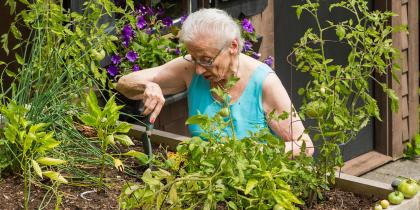Tips for Emotional Well-Being During the Coronavirus Pandemic

This is an unusual and difficult time we are living in. The threat of becoming sick with COVID-19, grief over losing loved ones, and necessary social distancing are challenging us like never before. If you’re not feeling like your usual self – maybe more anxious or worried, sleep changes, appetite change, trouble concentrating – this is a normal reaction.
Here are some ideas that seniors and people of all ages can use to help you cope during the COVID-19 pandemic:
Connect with at least one other person each day, by phone or video call. Staying in touch with others is one of the best things you can do for yourself – and you might even make someone else’s day by calling them.
Try to be easy on yourself. Life is different right now so it is healthy to have different expectations of ourselves for how we spend our time and how productive we are. It won’t always be like this.
Focus on what you can control. Recognizing that you cannot control COVID-19 or the future, but you can control what you do, like how much news you watch or what time you go to bed, may help you feel less anxious. You can read and educate yourself about the virus on the CDC website or subscribe to their email at CDC Subscription Service. Remember that knowledge is power but it’s best to get it from a reliable source.
Practice gratitude. Something else you can control is consciously thinking about the things that you DO have rather than focusing a lot of energy on what you are missing; thinking of the things that you are grateful for can be very healing and reassuring. They say if you can think of 5 things you are grateful for at night as you are going to sleep, you will wake up feeling better and more hopeful for the day.
Move around as much as you safely can. It is good for your muscles and circulation to stand up every half hour. Do what is safe and comfortable for you – an upper body stretch reaching up to the ceiling? Wiggle your toes while seated? Shrug or rotate your shoulders? A walk around your home or apartment?
Plan your day, one day at a time. When we focus on the current moment or day, we spend less time worrying about the future. It’s hard to envision the timeline of this pandemic and that can increase our anxiety or worry.
- Get dressed and try to keep as much of your usual morning routine and other daily routines as you can, e.g. watching particular shows, reading the newspaper.
- Make your meals part of the plan, set meal times and treat yourself, maybe turn the TV off and turn some soft music on. Also it’s important for your physical and emotional health to make sure you are eating and drinking a healthy amount.
- Have set times when you can plan and look forward to connecting with someone. Having the emails and phone numbers of your close friends and family at your fingertips is really helpful.
- Do something relaxing that you enjoy – watch TV, listen to music, read, write a letter, write in a journal, color – whatever you find comforting.
- Find a way to bring humor into every day, whether it’s watching a comedy show or just finding humor in some of the small and ridiculous things that can happen over the course of the day. Laughing at ourselves and the absurdities in life can be very therapeutic and reminds us that we are all in this together. Also, laughing out loud is good for both our physical and emotional health.
Sometimes, planning a whole day feels hard and it is all we can do to plan PARTS of the day. It may feel more manageable to just focus on the next few hours, rather than the whole day all at once and that’s OK. What’s most important is that you are giving yourself a feeling of being in control.
Practice relaxation exercises. Breathe. When you take in a slower, deeper breath and let it out slowly, it has a relaxing effect and is even good for your blood pressure. Try doing this at least three times in a row. Slow breath in through your nose, and a slow breath out through your mouth. Take note of how your body feels each time. This is good for calming your body and your mind.
Sometimes when we are anxious, we forget to breathe deeply and we take short shallow breaths. This type of breathing only adds to our anxiety. So remember every so often to check in with your breathing and take a good long deep breath. Why don’t you practice one right now…try to count to four breathing in through your nose and to seven breathing out through your mouth. You can also look for meditation exercises online: try YouTube or apps like Calm or Headspace.
If after giving some of these a try you’re still feeling overwhelmed, please reach out to the supports available in your life. These could include your doctor’s office, a spiritual advisor, a family member, or a friend or neighbor. If you are having thoughts of suicide, please call the National Suicide Prevention Lifeline at 1-800-273-TALK (8255) – help is always available.
Staff members Tammy Sadok, Andrea Flint, and Effie Hathaway of Hebrew SeniorLife’s Center Communities of Brookline also contributed to this blog post.
Blog Topics
Learn More
Spiritual Care Programs
Spiritual care programming is an important part of life on every Hebrew SeniorLife campus, with a full team of interfaith chaplains available to connect each resident, patient, and family member with the spiritual resources that resonate most for them.




